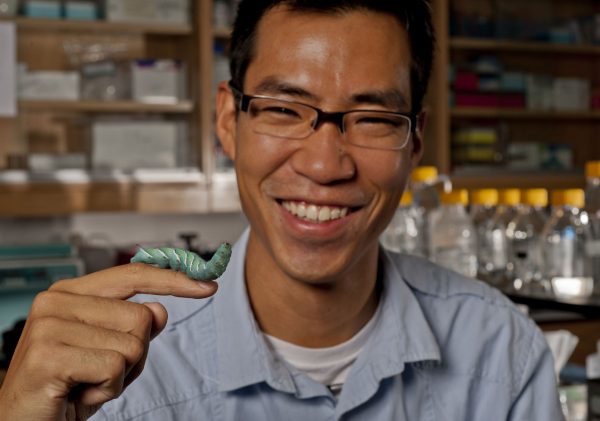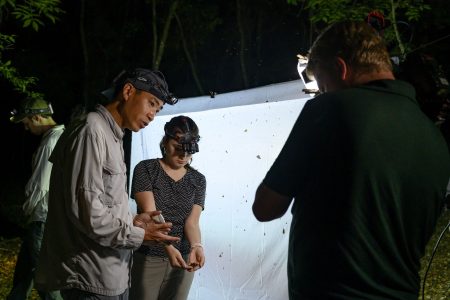Comedian Adam Conover believed the world would be better off without mosquitoes – until entomologist Akito Kawahara joined his “Factually!” podcast.
Kawahara, associate curator at the Florida Museum’s McGuire Center for Lepidoptera and Biodiversity, explained that mosquitoes are a vital source of food for birds, bats, fish and other wildlife. Some are even pollinators. Scientists are just beginning to understand the biology and varied ecological roles of this diverse group.
Conover softened: Maybe one of the most-loathed insects on the planet isn’t so bad after all.

Florida Museum photo by Kristen Grace
As studies have increasingly shown the dizzying drop in insect numbers due to climate change, pollution, habitat loss and other factors, Kawahara, whose research has largely focused on moth and butterfly evolution, felt he couldn’t stay on the sidelines.
“We’ve got to do something. We can’t live without insects,” he said, pointing to their importance as crop pollinators, carrion and waste disposal teams, silk-spinners and food.
The good news is that each of us can help. Here are three simple ways to lend insects a hand.
Diversify your lawn or garden
Whether you have a sprawling yard, a balcony container garden or a window box, you can foster flourishing insect populations by choosing native plants. Many insects rely on certain species of plants for food and habitat, relationships that span millions of years. Pockets of native plants not only sustain insects, they attract beneficial predators and act as wildlife corridors, links to other habitats. They can also be easier to grow and maintain than non-native plants.
“This is the time to plant natives, and it’s one of the easiest things you can do,” Kawahara said.
Keep insects safe by reducing or eliminating herbicides and pesticides. These chemicals kill beneficial insects as well as pest species, Kawahara said. As alternatives, use non-toxic products or rely on the natural predators that are supported by native plants.
UF/IFAS offers a variety of native plant resources for North Florida residents.
Turn off your lights

Florida Museum photo by Kristen Grace
Many insects active at nighttime rely on light to find mates, navigate and hunt for food – processes that can be disrupted by artificial light, Kawahara said. Fireflies signal to one another with species-recognized flashing patterns, and moths orient themselves by moonlight.
Kawahara recommends dimming or turning off outdoor lights at night and selecting bulbs that are more in the infrared spectrum than ultraviolet.
“Dark skies are becoming hard to find,” he said. “Turning off your lights is an easy and free thing you can do to help insects as well as other nocturnal animals.”
Become an insect investigator
As people spend more time at home, “it’s an opportunity to look at things in our backyards and change our bearings,” Kawahara said.
Many species of insects remain undiscovered, and our knowledge of even many common backyard species is limited, he said. You can help by recording your observations and sharing them on citizen science platforms such as iNaturalist.
Kawahara said the current lockdown has afforded him a rare opportunity to spend more time in nature himself. His lab meetings, now held via Zoom instead of in person, have turned into “nature nerd sessions,” he said, as members show off photos of species they’ve seen that week. They’ve even started their own lab iNaturalist channel.
“It’s actually really exciting,” he said.
Though he is a lifelong insect enthusiast, Kawahara has found himself intrigued by a new group of animals that he admitted he always thought were “kind of dumb” – birds.
“I didn’t really know much about birds, but I’ve started to learn,” he said. “It just shows how much is out there to be explored, and it’s amazing once you start to look.”
Listen to the full podcast.
Source: Akito Kawahara, kawahara@flmnh.ufl.edu